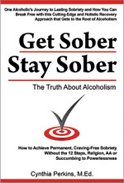Teenage Alcoholism
Despite a legal drinking age of 21 in the United States, more and more teenagers are experimenting with alcohol and teenage alcoholism is on the rise. This experimentation often sets the stage for serious consequences today and much later in life. Learn to recognize the signs and symptoms of alcoholism in a teenager today and it may save them from serious problems down the road. Better yet, learn how to prevent it all together. Once alcoholism is set into motion, we all know how hard it is to arrest, so the key lies in awareness and prevention.
Alcoholism, or any addiction for that matter, is a disease that is
triggered by an imbalance, deficiency or malfunctioning of
neurotransmitters in the reward pathway of the brain. The key to
prevention is to keep those neurotransmitters replenished and in
balance.
Neurotransmitters get depleted or malfunction for a
variety of reasons which include -- child abuse and neglect, nutritional
deficiencies, excessive stress, food allergies, not enough sleep,
environmental toxins, refined sugar and other refined foods like white
flour, caffeine, nicotine and not eating adequate protein and healthy
fat.
When we look over this list, we see that this makes just
about every child in society a potential victim for teen alcoholism and
drug addiction. This is why we see such a high incidence of addiction in
our teenagers today. Almost all children's neurotransmitters are
haywire because nobody is eating a healthy diet, there is high incidence
of child abuse and we're all exposed to a sea of environmental toxins
on a daily basis. Alcoholism in teenagers can be prevented in most cases
with loving, attentive and consistent parenting, a sugar free and
healthy diet and a clean environment.
The majority of teens who
abuse alcohol before high school graduation are influenced by their
peers and their situation at home. Children who have a supportive and
consistent home environment, who are active and engaged in their
community and who have parents who do not abuse alcohol are more likely
to succeed and prevail over teenage alcoholism and alcohol abuse. Sugar,
caffeine and nicotine effect the reward pathway in the brain, which is
where addiction develops, in the same manner as harder drugs and
alcohol. These substances often serve as a gateway to the harder stuff,
by depleting neurotransmitters and setting them up for addiction.
So
prevention of teenage alcoholism begins in childhood. Even if they are
born with a genetic predisposition to alcoholism, this can be
circumvented with a healthy diet, environmentally aware lifestyle and a
loving family environment. Provide your child with the kind of life that
supports healthy neurotransmitters and they will be less likely to
experiment with alcohol to begin with.
Steps to Prevent Teenage Alcoholism
The following steps prevent teenage alcoholism because they ensure that neurotransmitters will remain in balance. When neurotransmitters are functioning properly, then the need to seek comfort in drugs and alcohol will not occur.
- No sugar
- No white flour or other refined junk food
- No caffeine
- No nicotine
- Eat organic
- Test for nutritional deficiencies and supplement those that are indicated.
- Keep
environmental toxins like pesticides, herbicides, perfumes, air
fresheners, new building supplies etc. out of the living space. Switch
to non-toxic and natural personal care products and cleaning supplies.
- No amalgam (silver) dental fillings.
- Test for food allergies and food sensitivities and alter diet accordingly.
- Make sure they get adequate sleep.
- Prevent
emotional, physical, sexual abuse or neglect. If it has already
occurred, then take steps for emotional healing. Abuse most often occurs
by a family member, friend of the family or other trusted figure. Keep
alert for warning signs and be very careful who you allow to spend time
alone with your child. Make sure your child feels they can confide in
you. Teenage alcoholism or other addictions is extremely common among
those who've been abused.
- Teach your child how to communicate and express their feelings freely.
- Give them adequate love, support, affection and acceptance.
- Keep stress to a minimum and teach them healthy stress management techniques like exercise and deep breathing.
- Teach them how to fulfill themselves spiritually.
By
spiritually, I am not referring to religion. I mean, how to develop a
good relationship with themselves and engage in activities that make
them feel whole, alive and one with the Universe. This would include
activities like exercise, giving to the community, spending time in
nature, yoga, meditation, prayer, dance, art, gardening, music, sports,
relationships etc.
Signs and Symptoms of Alcoholism in Teenagers
There are many symptoms which in retrospect often seem quite obvious to the parents of teenagers who abuse alcohol. The symptoms are usually emotional; the child will become irritable, moody, and angry. Yes, this may sound like the average teenager, however, when alcohol is involved the mood swings will be more extreme. They may be extremely happy one minute and subdued the next or their may be bouts of rage or depression. When these emotional symptoms are combined with behavioral and physical symptoms of teen alcoholism, red flags should start waving quite clearly.
- There will also be changes in their attitude and values. They may engage in dishonest behavior, illegal behavior and lie to you. If they are getting in trouble with the law always look for alcohol and/or drug use. Full blown teenage alcoholism may not be far away.
- Take a close look at who they spend time with. If their friends are drinking and using, then you can almost guarantee they are as well. Remember birds of a feather flock together.
- Changes in grades and attitude towards school may change. Their grades may drop or they begin skipping classes, getting detention or suspended.
- Watch for changes in appetite and sleep patterns. Do they have the munchies or are they never hungry? Are they sleeping too much or at inappropriate times?
- They avoid you when they come home and go straight to their room. They are reluctant to engage in conversation with you.
- You see evidence of alcohol consumption in their room or car. They slur their speech, stagger or fall down.
- They spend a lot of money but can't account for where it went.
- They're no longer interested in activities they used to enjoy.
- Other signs of teenage alcoholism may include memory lapse, poor concentration, fatigue, and red rimmed eyes.
Other Scary Facts and Statistics for Teen Alcoholism
Many people are surprised to find out how young children are actually when trying their first drink and how many children die each year simply due to drinking and abusing alcohol. Teen alcoholism is much more common than people realize.
- The average age for trying alcohol is age 11 in boys and age 13 for girls.
- By age 14, 41% of children have had at least one alcoholic drink.
- The average age when American teenagers begin drinking on a regular basis is 15 years old.
- More than 5000 deaths are linked to underage drinking each year.
The direst consequence of teenage alcoholism is of course death however it also increases violence, affects school work and can make a child lose their identity, self confidence and direction.
- Teens that begin drinking before they're 15 are five times more likely to develop a dependency on alcohol.
- It is estimated that more than 3 million teenagers suffer from alcoholism
- Alcohol is a leading contributor to the three leading causes of death
for teenagers – motor vehicle accidents, suicide, and homicide.
- Alcohol abuse can lead to the use of other harder drugs.
- Many teens who suffer from alcoholism have a history of abuse.
- Teens at high risk for alcohol abuse have behavior problems.
Neurotransmitters that play a role in teenage alcoholism are also
responsible for other behavioral problems.
- Teens who abuse alcohol often have parents who are harsh, hostile, and reject them.
- Lack of parental involvement and support has been linked to the frequency of teenage drinking.
- Many teen alcoholics have a parent who suffers from alcoholism.
Prevention
of alcoholism in a teenager is always the best course of action,
however if you're already beyond that point, it's never too late.
Catching it and getting the appropriate help before they are an adult is
crucial.
The longer someone is engaged in an active addiction,
the more damage that is done to the brain and their neurotransmitters
and the harder it is to stop the physiological process of addiction.
By
recognizing the symptoms of teenage alcoholism and taking immediate
action, reversing the damage and achieving successful sobriety will be
much easier than it would be if they had years of addiction under their
belt. Teen alcoholism does not have to be carried into adulthood.
Learn more about the biochemical approach to alcoholism and help your teenager achieve successful sobriety without cravings that will last them a lifetime.
Yes,
it is true. You have the power to make simple changes in your child's
life that can have a dramatic impact on their future. Neurotransmitter
deficiencies or malfunctioning is not only a major factor in addiction,
but also a large variety of other mental and physical health conditions
like anxiety, fatigue, irritability, weight issues, sleep problems,
obesity, depression, migraines, attention deficit disorder,
hyperactivity, autism, obsessive compulsive disorder, behavioral
problems, Parkinson's, Alzheimer's, dementia and many others. You'll not
only be protecting them from teenage alcoholism, but all these other
health conditions as well.


